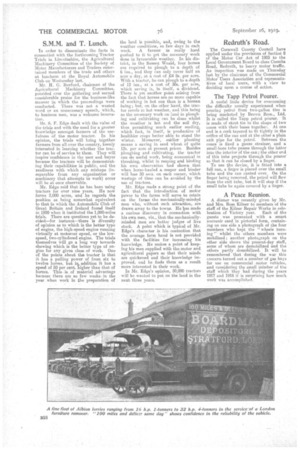S.M.M. and T. Lunch.
Page 6

If you've noticed an error in this article please click here to report it so we can fix it.
In order to disseminate the facts in oonnectimi with the forthcoming Tractor Trials in Lincolnshire, the Agricultural Machinery Committee of the Society of Motor Manufacturers and Traders entertained members of the trade ana others at luncheon at the Royal Automobile Club on Wednesday last. Mr. H. G. Buriord, chairman of the Agricultural Machinery Committee, presided over the gatheringand earned considerable praise for the business-like manner in which the proceedings were conducted. There was not, a wasted word or an unnecessary speech, which, to business men, was a welcome innovation.
Mr. S. F. Edge dealt with the value of the trials and with the need, for a greater knowledge amongst farmers of the. usefulness of the motor tractor. In his opinion, the trials will bring together farmers from all over the country, keenly interested in learning whether the tractor can be of service to them. They will inspire 'confidence in the user and .buyer because the tractors will be demonstrating their capabilities in public, and the readiness with. which any mishaps (inseparable from any organization or machinery that attempts to work) occur will be at once observable.
Mr. Edge said that he has be-en using tractors for over nine years. He now farms 2,000 acres, and he regards the position as being somewhat equivalent to that in which the Automobile Club of Great Britain and Ireland found itself in 1900 when iti instituted the 1,000-miles trials. There are questions yet to be decided—for instance—there is diversity of opinion as to which is the better type of engine, the high-speed engine running virtually at motorcar speed, or the lowspeed, two-cylindered engine. The trials themselves will go a long way towards showing Which is the better type of engine for any given class of work. One of the pointe. about the tractor is that it has a pulling power of front eix to twelve horses, but ire addition it has a speed of 30 per cent, higher than that of horses. This. is of material advantage because there are so few, weeks-in the year when work in the preparation of the land is possible, and, owing to the weather conditions, so few days in each week. A farmer is really hard pushed to it to get the necessary work done in favourable weather. In his district, in the Sasses Weald, four horses are required to plough to a depth of 6 ins., and they can only cover half an acre a day, at. a cost of £4 8s. per acre. With a tractor, he can plough to a depth of 12 ins., at a cost of 30s. per acre, which saving is, in itself, a dividend. There is yet another point arising from the fact that horses are no more capable of working in hot sun than is a human being; but, on the other hand, the tractor revels in hot weather, and this being so the necessary work on land in ploughlog and cultivating can be done whilst the weather is hot and the soil dry, thus permitting much earlier seeding, which fact, in itself, is productive of healthier crops better able to stand the winter. Moreover, eaedier planting means a saving in seed wheat of quite 12s. per acre at present prices. Besides ploughing and cultivating, the tractor can do useful work, being economical in threshing, whilst in reaping and binding his own observation had shown that when horse-hauled a reaper and binder will lose 30 sees, on each corner, which wastage of time can be avoided by the use of tractors.
Mr. Edge made a strong point of the fact that the introduction of motor power to the farms will serve to retain on the feriae the meobanically-minded men who, without such attraction, are drawn away to the towns. He ties made a curious discovery in connection with his own men, viz., that the mechanicallyminded men are better judges of live stock. A point which is typical of Mr. Edge's character is his contention that the average farm hand is not provided with the facilities for increeeing his knowledge. He makes a point of keeping his men supplied with the motor and agricultural papers so that their minds are quickened and their knowledge improved, and he finds them as a result more interested in their work.
In Mr. Edge's opinion, 50,000 tractors will be wanted to put on the land in the next three years.
























